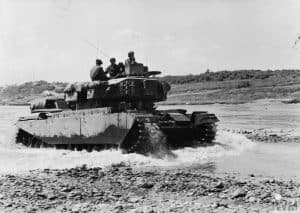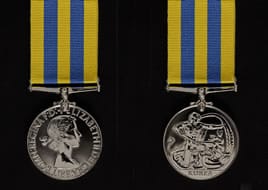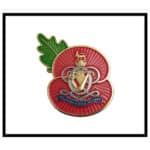Korea
The 8th Hussars arrived in Korea as part of the 29th British Infantry Brigade on 14 November 1950 and were sent south to Seoul where the Allied forces were already in retreat from the Chinese.
Almost as soon as they arrived there, on 2 January 1951 they were involved in a bloody and vicious defensive action holding the northern perimeter of Seoul.
In a disastrous action known as the ‘Battle of Happy Valley’ Recce Troop was completely cut off and either killed or captured, whilst the rest of the Regiment withdrew south of the River Han.
On 16 February ‘C’ Squadron supported a deliberate assault by the Glosters on the highest feature in the area, known only as Hill 327.
It was such a success that it was called ‘Operation Copy Book’, and from there the 8th Hussars helped push the Chinese back over the River Han by the 20th.
22-25 April saw the 8th Hussars as the only armoured unit supporting their Brigade during the gallant but disastrous defence of the Imjin River. Large Chinese infiltration attacks overnight had left the Glosters completely cut off on the northern side of the river, and it turned out that the Brigade was facing the main enemy effort.

A Centurion tank of the 8th KRIH fording a river in Korea.© IWM (BF 11477)
Though repeatedly trying to relieve the beleaguered Glosters over impossible terrain, the strength of the enemy’s assault forced a withdrawal, with each Troop involved in actions that enabled whole Battalions to escape the net.
Ammunition ran so low that the tanks literally had to drive back over the Chinese infantry.
From 3-12 October the 8th Hussars supported the successful assaults on the hills Kowang-San and Maryang-San.
‘A’ Squadron was to attack from the high ground, but only three tanks made it up the very steep slopes to lead an assault along a knife-edge ridge, through the forest to get onto the objective.
‘B’ Squadron meanwhile was down in the valleys ‘firing’ the infantry onto position after position, enabling them to move while keeping the enemy’s heads down.
Before leaving Korea several small but bitter actions were fought, inevitably in difficult conditions of terrain, normally considered totally unsuitable for tanks, and of weather whose, summer rains flooded the Imjin River to a depth of twenty feet.
Their main objective was to protect the capital Seoul, and in this the Division was successful.
On 15th December the 8th Hussars embarked on MV Georgic, leaving behind a war that was to drag on for another eighteen months.
Discover the recollections of Capt Peter Ormrod MC with his compelling description of an often overlooked and very bloody war.
Gallantry Awards
- Maj WGO Butler DSO
- Maj PHV de Clermont DSO
- Maj PH Huth DSO
- Lt JC Butler MC
- Capt GS Murray MC
- Capt PC Ormrod MC
- Capt RW Piper MC
- Lt CDB Troughton MC
- Capt The Hon RDG Winn MC
- 2Lt JB Venner MC
- Tpr HL Bomber MM
- Cpl DA Jennings MM
- Sgt F Rowan MM
Battle Honours
The 8th King’s Royal Irish Hussars were awarded a total of 5 battle honours during this period.
Why not read about the story behind each one:
Campaign Medal
 The Korea Medal was awarded to personnel who participated in the Korean War between July 1950 and 27 July 1953.
The Korea Medal was awarded to personnel who participated in the Korean War between July 1950 and 27 July 1953.


